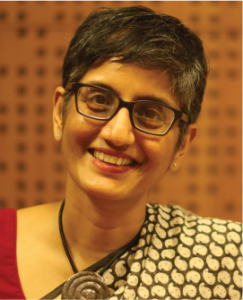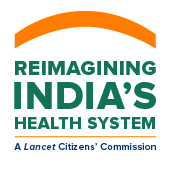In Conversation: Neela Saldanha, Executive Director, Yale Research Initiative on Innovation and Scale (Y-RISE), Yale University
December 12, 2022

I am an applied behavioral scientist interested in policy for development, particularly healthcare. I started out in quite a different direction: after an MBA, I began in the private sector – in sales & marketing with food companies. The “tasty vs. healthy” debate made me think further about how people make choices with trade-offs, which led me to a PhD with a focus on behavioral science. A few years ago, I was thrilled to have a chance to apply my learning to social impact by becoming the Founding Director of the Centre for Social and Behaviour Change (CSBC) at Ashoka University. CSBC was established through generous funding from the Bill & Melinda Gates Foundation to develop evidence-based behavior change interventions to address problems in development. The work opened my eyes to issues in public health that I, as a privileged Indian, had taken for granted. What could we do to increase immunization uptake? How could we give families the right information about spacing their families and choosing contraception? How do we make it easy for pregnant women to take the recommended daily iron & folic acid supplements during pregnancy that prevent anemia and complications in childbirth?
At first, I was interested in the health system to optimize behavior change interventions. Which channels should we disseminate communication? How should we work with community health workers? I soon realized, however, that for large and lasting change, we cannot work in isolation – we need to intersect behavioral, demand-side interventions with supply and systems. This requires an understanding of the current health system: roles, incentives, norms and processes. With my current role on the Lancet Commission, I am learning and have become more interested in the larger question of health system change.
I work in the Finance workstream, chaired by Dr. Nachiket Mor and Prof. Tarun Khanna. The financing workstream examines several questions including total funding required for health outcomes and how the existing funding can be optimally used. Within this workstream, I work with Bindu Ananth and Tejasvi Ravi on optimizing the value of out-of-pocket expenditures (OOPE).
OOPE is the dominant way in which households in India finance their health expenditures. While we should strive to reduce this through insurance for example, it is unlikely that OOPE will get to zero. So helping people get the most value out of their OOPE is a critical part of designing a good universal healthcare system.
With my behavioral science background, I look to understand the psychological reasons behind high OOPE so that we can redesign systems that work with human nature, not against it. A big issue is that healthcare decisions are often “intertemporal” – costs and benefits do not occur in the same time period. As human beings we tend to overweight the present relative to the future “present bias.” Take preventive care. The costs of getting a mammogram are in the present – money, time, emotional costs. The benefits are in the future, not certain (one could still get breast cancer even with early detection) and abstract (NOT getting breast cancer would be a good outcome). We therefore underinvest in preventive care or in buying insurance which may lead to catastrophic health expenditures down the road. A good health system would keep these psychological tendencies in mind when designing or regulating insurance e.g. making preventive care easy and cheap to access and making benefits more salient and vivid.
High out-of-pocket expenditure is obviously a barrier to achieving UHC and unless we take steps to reduce it, I don’t see how we can achieve UHC. Even within current tax-to-GDP ratios and allocations towards healthcare, we can do much better by shifting government expenditures to healthcare. This requires however, moving expenditures from other categories, which I see as a challenge. Related to this is the issue of citizen concern and demand around healthcare. Although many Indians fall into poverty each year because of catastrophic health expenditures, we really don’t see the level of electoral demand for universal health care that puts pressure on elected officials to rethink health as a priority item.
A second challenge is the effective utilization of current funds. Yes, current spending on healthcare is low. However, increasing expenditures don’t necessarily mean better health outcomes unless we tightly link expenses to outcomes. Currently health budgets are “line” items – we need to do a better job linking them to health outcomes and negotiating payments that way. Again, this means thinking boldly about incentives and changing existing systems – a hard ask!
Of course I hope the carefully thought out recommendations are implemented. Importantly, I hope that the implementation is done in a truly democratic spirit of discussion and debate, not only at the level of Parliament but at individual citizen level. I would like to see universal health care become a part of every citizen’s concern. We have some recommendations for the short to medium term to transition towards universal health care. The experience of countries such as Sri Lanka, Costa Rica and Thailand have shown that health care can be dramatically improved in a short period of time and someday I hope to see India in that list!
